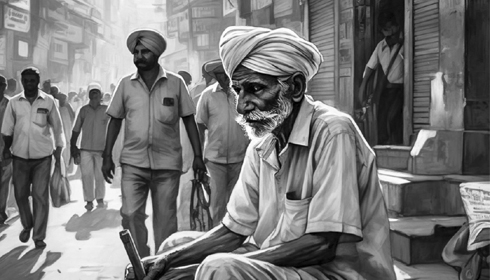
NHRC Seminar Highlights Challenges and Solutions for India’s Ageing Population
A day-long seminar titled "Ageing in India: Actionable Solutions—Drawing Insights from Global, Regional, and National Best Practices" was organised by the National Human Rights Commission (NHRC) in conjunction with the Sankala Foundation. This seminar, which included active participation from NITI Aayog and the Ministry of Social Justice & Empowerment, focused on healthcare, economic security, and social inclusion for India's ageing population.
In his inaugural presentation, NHRC Secretary-General Shri Bharat Lal emphasised the importance of systemic reforms in the operation of elderly facilities. He emphasised the commission's strong collaboration with civil society organisations, special rapporteurs, and human rights defenders to protect the well-being of the elderly. "It is time to work on an action-oriented model, including best practices for replication for the overall welfare of the elderly population," added the researcher. Shri Lal also advocated collaborative synergy among all stakeholders and emphasised the significance of developing forums for the elderly to actively engage with society.
Ms. Monali P. Dhakate, Joint Secretary, Ministry of Social Justice & Empowerment, commented on existing policies, including the 2007 Maintenance and Welfare of Parents and Senior Citizens Act and the Atal Vayo Abhyuday Yojana. These projects seek to improve the quality of life for elderly individuals in India, demonstrating the government's commitment to meeting their needs.
Dr. Abha Jaiswal, from the Sankala Foundation, emphasised the importance of building comprehensive care procedures for India's expanding elderly population. The speaker continued, "Addressing these needs can present significant opportunities for economic growth and societal well-being."
Dr. V. K. Paul, Member (Health) of NITI Aayog, presided over the first thematic session on the health and nutrition needs of the elderly. He praised the NHRC for its achievements and stressed the necessity of tackling current and future difficultiesExperts advocated a comprehensive health and nutrition program; specialised services for elderly women; and increased health insurance coverage.e.
The second theme session, headed by Shri Amit Yadav, Secretary, Ministry of Social Justice & Empowerment, focused on the economic security, social inclusion, and quality of life of older residents. Recommendations included engaging local and private partners to protect the elderly's rights, as well as incorporating family medicine into healthcare to provide comprehensive care.
The symposium on ageing in India concluded with some tangible proposals for addressing the multifaceted issues that the elderly face. ACRA's crucial recommendation was to provide a comprehensive health and nutrition package customised to the specific needs of senior citizens, ensuring their physical and mental well-being.plementing this was a focus on encouraging home-based care efforts, which might provide a more pleasant and familiar environment for the elderly while also reinforcing current government schemes to increase their reach and efficacy.
Drawing on foreign best practices has emerged as an important tactic for defining India's senior care policies. By incorporating effective models from throughout the world, India can improve its approach to dealing with the complex difficulties that come with an ageing population. Policymakers and stakeholders emphasised the critical step of developing segregated databases for targeted interventions, which enables them to identify specific needs and develop precise solutions.
Equally crucial was guaranteeing the elderly's active engagement in society by instilling a sense of dignity, independence, and inclusion. Empowering them to make significant contributions enriches their lives while also strengthening the social fabric. These recommendations aim to build a comprehensive framework for senior care that balances health, social inclusion, and policy innovation.
The event drew a varied range of attendees, including government officials, healthcare specialists, researchers, and NGO representatives. WHO, UNFPA, Helpage India, and the TATA Trusts all contributed to the discussions.
Dr. K. Madan Gopal, an advisor at the National Health Systems Resource Centre, emphasised the significance of integrating the public and commercial sectors in developing sustainable ageing care models. Dr. Manjari Chaturvedi, of Healthy Ageing India, emphasised the importance of hearing the elderly's voices and prioritising their health.
This seminar followed the national meeting on October 18, 2024, which explored the difficulties faced by the elderly. By focusing on solutions, the NHRC is actively working with stakeholders to implement concrete initiatives.